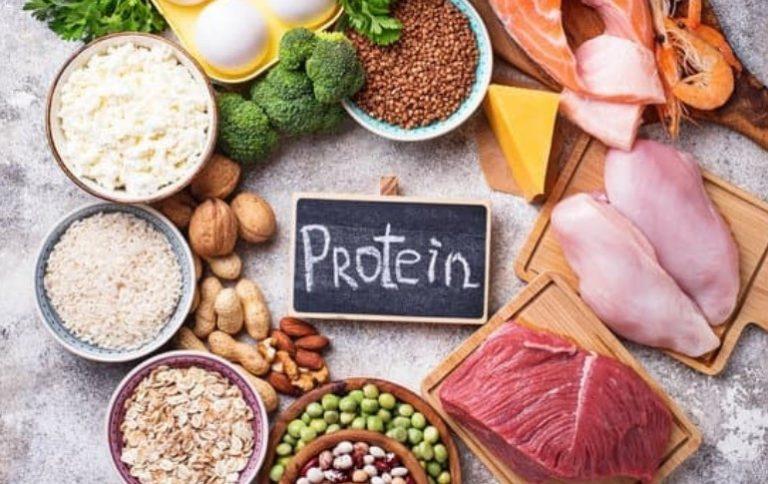Post Contents
Are you curious about how much protein you need in your daily diet? Well, look no further! In this blog post, we will uncover the secrets behind determining your optimal protein intake. Whether you’re an athlete looking to build muscle or just someone wanting to maintain a healthy lifestyle, understanding your protein needs is crucial. So, let’s dive in and discover the fascinating world of protein requirements together! Get ready to unlock the key to fueling your body with the right amount of this essential nutrient. Let’s get started on our quest for knowledge!
The Importance of Protein in Diets

Protein is an essential nutrient with multiple vital roles.
- Firstly, it’s crucial for muscle repair and growth, aiding in recovery after physical activity.
- Secondly, protein supports a healthy immune system by enabling the production of antibodies that fight infections.
- Additionally, it helps with weight management by increasing feelings of fullness and reducing overeating.
- Lastly, protein is key to regulating hormones and producing enzymes for various bodily processes.
Factors That Affect Daily Protein Requirements
Determining your daily protein requirements involves several key factors. Your activity level is a significant consideration, as athletes and active individuals typically need more protein than those leading a sedentary lifestyle.
Age and gender also matter; generally, men require more protein due to their larger muscle mass, and as we age, our bodies become less efficient at using dietary protein for muscle maintenance.
Body composition is a crucial factor. People with more lean body mass usually require extra protein to support muscle growth and repair compared to those with higher body fat levels.
Health conditions and injuries can affect protein needs. Conditions like kidney disease or diabetes may necessitate professional guidance before adjusting protein intake.
To determine your specific protein needs, consulting with a registered dietitian or nutritionist in the UK is recommended for personalized recommendations based on your unique circumstances and goals.
How Do I Calculate How Much Protein I Need?

To calculate your protein needs, you have two primary methods:
- Based on Body Weight: The common approach is to use your body weight. The recommended dietary allowance (RDA) for protein is 0.8 grams per kilogram of body weight daily. So, if you weigh 70 kilograms, you’d need 56 grams of protein per day. Keep in mind that individual needs can vary based on factors like activity level, muscle mass, and age.
- Based on Lean Body Mass: A more precise method involves your lean body mass (LBM), which is your muscle mass minus fat and bone. To calculate LBM, you can use a formula, such as:
-
- For men: LBM = (weight in pounds x 0.65) – (19.2 x age)
- For women: LBM = (weight in pounds x 0.55) – (19.2 x age)
Once you determine your LBM, multiply it by 1.2 to 2 grams of protein per kilogram to find your daily protein needs. For instance, if your LBM is 50 kilograms, you’d require 60 to 100 grams of protein daily. This method provides a more tailored protein recommendation based on your body composition.
How Much Protein Do I Need a Day?
In simple terms, your daily protein needs depend on your age, how active you are, and your overall health. Here’s a basic guideline:
- For most people: You need about 0.75 grams of protein for every kilogram (2.2 pounds) of your body weight. So, if you weigh 70 kilograms (154 pounds), you’d need around 52.5 grams of protein each day.
- If you’re very active: If you exercise a lot or play sports, you might need a bit more protein, like 1.6 to 2.4 grams for each kilogram of your body weight.
- For kids and older adults: They may need more protein to grow or stay healthy.
- If you have certain health problems: Some conditions can change how much protein you should have. Ask a doctor or dietitian for guidance.
In the end, it’s a good idea to talk to a healthcare pro or a diet expert to figure out exactly how much protein you need based on your specific situation and goals.
How Much Protein Per Day to Build Muscle?
To maximize muscle growth, your daily protein needs depend on factors like your body weight, activity level, and goals. Typically, those aiming to build muscle aim for 1.2-2 grams of protein per kilogram of body weight each day. For example, if you weigh 70 kilograms, that’s 84-140 grams of protein daily. Remember, individual needs can vary.
Distribute protein evenly throughout the day rather than consuming it all at once. This supports muscle repair and recovery. Timing protein around workouts can also help muscle growth.
While protein is vital, don’t forget the importance of carbohydrates and fats for overall health and performance. A balanced diet with the right calorie surplus is essential for muscle gain.
Your exact protein requirement varies, so aim for 1.2-2 grams/kg of body weight daily, spread it out, and consider nutrient timing around workouts. Combining proper nutrition with strength training sets you up for optimal muscle development over time!
How Many Grams of Protein Per Day for a Woman?

When it comes to protein intake, women have unique nutritional needs. The amount of protein required for optimal health varies based on several factors such as age, weight, activity level, and overall health.
For sedentary women who engage in minimal physical activity, the recommended daily protein intake is around 0.8 grams per kilogram of body weight. However, most experts agree that active women may benefit from slightly higher protein consumption.
If you’re regularly engaging in moderate to intense exercise or strength training, increasing your protein intake to approximately 1.2-1.6 grams per kilogram of body weight can support muscle repair and growth.
It’s important to note that these recommendations are general guidelines and individual needs may vary. If you have specific dietary requirements or health concerns, consulting with a registered dietitian can help determine the right amount of protein for your unique circumstances.
The Risks of Consuming Too Much or Too Little Protein
Consuming the right amount of protein is crucial for maintaining optimal health. However, both excessive and inadequate protein intake can have negative consequences on your body.
Too much protein in your diet can put a strain on your kidneys, as they are responsible for filtering waste products from protein metabolism. This increased workload may lead to kidney damage over time. Additionally, consuming excessive amounts of animal-based proteins has been linked to an increased risk of heart disease and certain types of cancer.
On the other hand, not consuming enough protein can also have detrimental effects on your health. Building and repairing tissues, manufacturing enzymes and hormones, and supporting a strong immune system all depend on protein. Insufficient protein intake can result in muscle wasting, weakened immune function, slower wound healing, and impaired growth and development in children.
Tips for Meeting Your Daily Protein Goals

- Plan your meals: One of the best ways to ensure you meet your daily protein goals is by planning your meals. This allows you to incorporate protein-rich foods into each meal and snack throughout the day.
- Include a variety of protein sources: Don’t rely solely on one type of protein source. Mix it up by including sources such as lean meats, poultry, fish, eggs, dairy products, legumes, nuts, and seeds in your diet. This not only helps prevent monotony but also provides a wider range of essential amino acids.
- Prioritize high-protein snacks: Snacking can be an opportunity to boost your daily protein intake. Opt for snacks like Greek yoghurt with berries, hard-boiled eggs, cottage cheese with vegetables or hummus with whole-grain crackers.
- Make use of supplements if necessary: Sometimes it can be challenging to meet all of your daily protein needs through food alone. In these cases, consider incorporating a high-quality protein supplement such as whey or plant-based powders into your routine.
- Stay hydrated: Drinking enough water is crucial for proper digestion and utilization of proteins in the body. Aim to drink at least 8 glasses (64 ounces) per day to support optimal nutrient absorption.
- Variety is key: Don’t get stuck eating the same high-protein foods every day! Experiment with different recipes and cooking methods to keep things interesting and enjoyable while meeting your daily protein goals.
- Seek guidance from a registered dietitian: If you’re unsure about how much protein you need or are struggling to meet your goals despite following these tips, seek guidance from a registered dietitian who can provide personalized recommendations based on factors such as age, sex, activity level, and health status.
Remember that everyone’s dietary needs are unique; what works for one person may not work for another when it comes to protein intake. It’s important to listen to your body and make adjustments as
Conclusion
In conclusion, the amount of protein you need each day depends on various factors, including your body weight, activity level, age, and health conditions. A general guideline is to aim for about 0.75 grams of protein per kilogram of body weight, but this can vary.
If you’re actively building muscle, you might need 1.2-2 grams of protein per kilogram. Children, older adults, and those with specific health concerns may require different amounts.
It’s preferable to speak with a medical practitioner or certified dietician for individualised advice. They can help you determine your ideal daily protein intake based on your unique circumstances and goals, ensuring that you meet your nutritional needs while maintaining a healthy and balanced diet.


